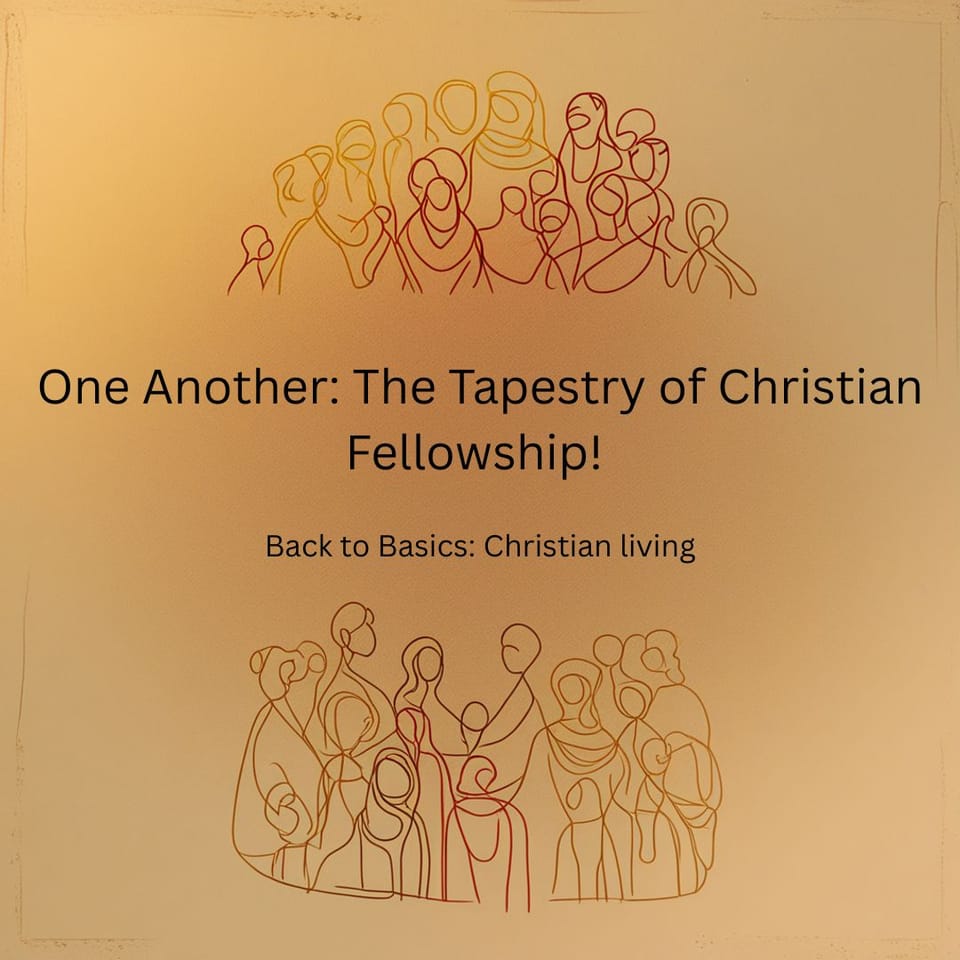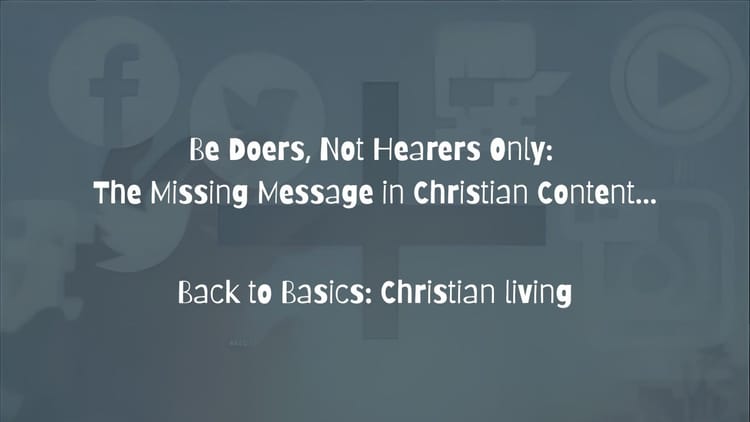One Another: The Tapestry of Christian Fellowship!

Living Out the "One Another" Commands
The phrase "one another" appears numerous times in the New Testament, creating a rich tapestry of instruction for how believers should relate to each other. These commandments form the foundation of Christian community and demonstrate how we are to live out our faith together.
In the King James Version, these "one another" passages reveal God's heart for unity, love, and mutual support among His people. From "love one another" to "bear one another's burdens," these instructions show us that the Christian life was never meant to be lived in isolation.
Let's explore some of the most significant "one another" commands in the KJV and discover how they challenge us to move beyond individualistic faith toward authentic biblical community:
One Another: The Tapestry of Christian Fellowship!
In a world increasingly characterised by individualism and digital isolation, the biblical concept of community stands in stark contrast. Throughout the New Testament, particularly in the beautiful language of the King James Version, we find a recurring theme woven into the fabric of Christian teaching—the commands to care for "one another." These instructions form a divine pattern for relationships within the body of Christ, revealing God's heart for His church to function as an interdependent family rather than isolated believers.
As we explore these "one another" commandments, we discover that authentic Christian faith cannot be lived in solitude. The early church understood this deeply, demonstrating a level of community that transformed the ancient world. Today, these same principles can revolutionise our churches and relationships if we dare to embrace them fully.
The Foundation: Love One Another
The cornerstone of all "one another" commands is undoubtedly love. Jesus Himself established this priority when He told His disciples, "A new commandment I give unto you, that ye love one another; as I have loved you, that ye also love one another" (John 13:34 KJV). This wasn't merely a suggestion but the identifying marker of Christian discipleship, as He continued, "By this shall all men know that ye are my disciples, if ye have love one to another" (John 13:35 KJV).
The apostles continued this emphasis. John writes, "Beloved, let us love one another: for love is of God; and everyone that loveth is born of God, and knoweth God" (1 John 4:7 KJV). Peter exhorts believers to "love one another with a pure heart fervently" (1 Peter 1:22 KJV), while Paul instructs the Romans to "be kindly affectioned one to another with brotherly love" (Romans 12:10 KJV).
This love isn't a vague sentiment but manifests in practical action and sacrifice, forming the foundation upon which all other "one another" commands rest.
The Structure: Honour & Submission
Upon the foundation of love, the Bible builds a structure of mutual honour and humble submission. Paul instructs believers to "in honour preferring one another" (Romans 12:10 KJV) and to "submit yourselves one to another in the fear of God" (Ephesians 5:21 KJV).
This radical countercultural posture challenges our natural tendencies toward self-promotion and dominance. Instead of climbing social ladders, Christians are called to a different way—one that values others above self and seeks to serve rather than be served, following the example of Christ who "came not to be ministered unto, but to minister" (Matthew 20:28 KJV).
The Walls: Bearing and Forbearing
Every community faces tensions and difficulties. The "one another" commands provide guidance for navigating these challenges through mutual support and patience. We are instructed to "Bear ye one another's burdens and so fulfil the law of Christ" (Galatians 6:2 KJV), recognising that none of us should struggle alone when part of Christ's body.
This burden-bearing is accompanied by mutual forbearance—"Forbearing one another, and forgiving one another, if any man have a quarrel against any: even as Christ forgave you, so also do ye" (Colossians 3:13 KJV). The Christian community is not perfect but is marked by grace, patience, and the willingness to extend the same forgiveness we have received from Christ.
The Furnishings: Edification and Encouragement
Within the structure of Christian community, we find the beautiful furnishings of mutual edification and encouragement. Paul urges believers to "comfort one another" (1 Thessalonians 4:18 KJV) and to "edify one another" (1 Thessalonians 5:11 KJV). The writer of Hebrews challenges us to "consider one another to provoke unto love and to good works" (Hebrews 10:24 KJV).
This mutual ministry of encouragement recognises that faith flourishes best in community, where gifts are shared, strengths complement weaknesses, and each member contributes to the growth of the whole. As iron sharpens iron, so believers are called to sharpen one another through thoughtful encouragement and truth spoken in love.
The Daily Rhythms: Hospitality and Harmony
The "one another" commands extend to the practical rhythms of daily life. Peter instructs, "Use hospitality one to another without grudging" (1 Peter 4:9 KJV), while Paul urges believers to "receive ye one another, as Christ also received us to the glory of God" (Romans 15:7 KJV).
This open-hearted welcome of fellow believers into our homes and lives creates space for deeper connections and authentic fellowship. Additionally, Paul exhorts Christians to "be of the same mind one toward another" (Romans 12:16 KJV) and to "lie not one to another" (Colossians 3:9 KJV), emphasising the importance of harmony, truth, and integrity in all relationships.
The Witness: Unity Before the World
Ultimately, the "one another" commands shape a community that bears powerful witness to a watching world. Jesus prayed for His followers "that they all may be one; as thou, Father, art in me, and I in thee, that they also may be one in us: that the world may believe that thou hast sent me" (John 17:21 KJV).
Our unity and mutual care demonstrate the reality of Christ's transforming power. In a fragmented society marked by division and self-interest, communities that embody these "one another" principles shine as beacons of hope and alternative witness to the kingdom of God.
The Challenge for Today
The "one another" commands challenge our contemporary tendency toward consumer Christianity and digital relationships. They call us back to authentic, embodied community where we bear one another's burdens, speak truth in love, forgive generously, and spur each other toward Christlikeness.
As we consider these commands, we might ask ourselves: How are we actively participating in "one another" ministry? Are we merely attendees of religious services, or are we deeply invested in the messy, beautiful work of Christian community? Do we know the burdens our brothers and sisters carry? Have we opened our homes and lives to fellow believers?
The tapestry of "one another" commands in Scripture offers us a compelling vision for Christian fellowship—one that transcends cultural individualism and calls us back to the interdependent community God designed His church to be. As we embrace these principles, we not only experience the fullness of life in Christ but also offer the world a powerful testimony to the transforming reality of the gospel…
Key Takeaways:
- Love is foundational: Jesus established love as the cornerstone of Christian relationships—"A new commandment I give unto you, that ye love one another" (John 13:34 KJV).
- Christian community requires mutual submission: We are called to "submit yourselves one to another in the fear of God" (Ephesians 5:21 KJV), placing others' needs above our own.
- Burden-bearing fulfils Christ's law: "Bear ye one another's burdens and so fulfil the law of Christ" (Galatians 6:2 KJV), showing that Christian community involves practical support.
- Forgiveness is essential: We must extend to others the same grace Christ has shown us—"Forbearing one another and forgiving one another" (Colossians 3:13 KJV).
- Mutual edification strengthens faith: Christians are called to "comfort one another" and "edify one another" (1 Thessalonians 4:18, 5:11 KJV), building each other up in faith.
- Hospitality creates deeper connections: "Use hospitality one to another without grudging" (1 Peter 4:9 KJV), opening our homes and lives to fellow believers.
- Unity testifies to Christ: Our "one another" relationships witness to the world about the reality of Christ's transforming power (John 17:21 KJV).





